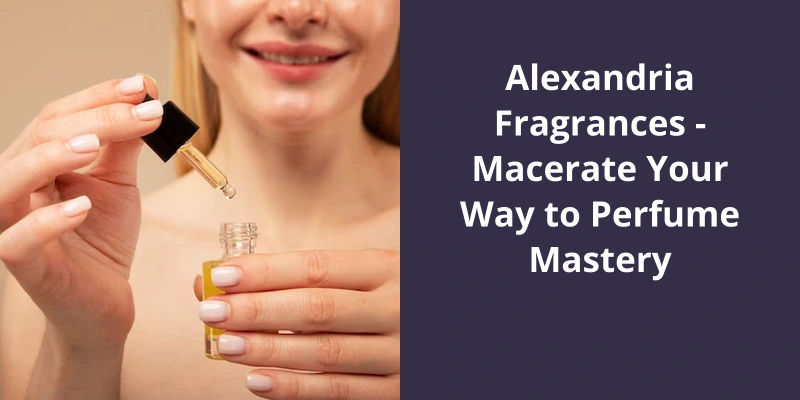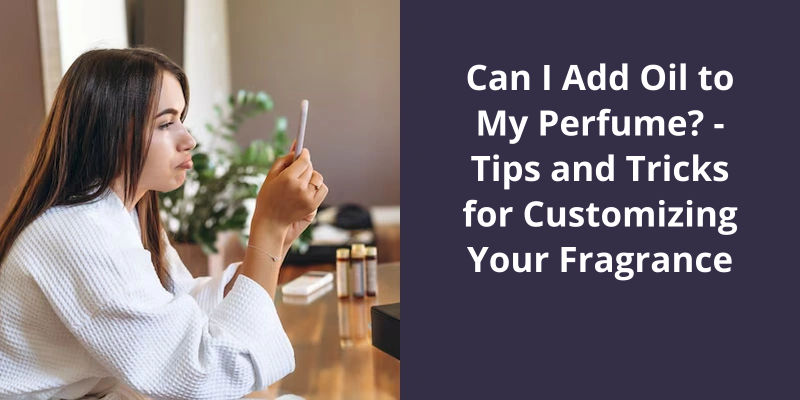Alexandria Fragrances is a highly admired perfume brand known for creating unique and exquisite scents. They are renowned for their ability to reproduce popular, high-end fragrances at a more affordable price. With a wide array of offerings, Alexandria Fragrances stands out in the market due to their use of premium quality ingredients. Perfume connoisseurs appreciate this brand not only for its rich and sophisticated scents but also for the impressive longevity and silage of its products. Regardless if you are into fruity, fresh, oriental, or woody fragrances, there is something for everyone’s preferences in the perfume collection that Alexandria Fragrances presents.

Do Alexandria Fragrances Need to Macerate?
An Alexandria fragrance once and I was not happy with how it initially smelled when I first sprayed it. However, I followed the advice of some members of the fragrance community and let it sit for a few weeks, And when I tried it again, the scent had developed and matured in a beautiful way, making it much more pleasant to wear.
The reason why Alexandria fragrances need to macerate is to help the different components of the scent to meld together and create a cohesive, harmonious fragrance. During the maceration process, the ingredients in the fragrance blend, resulting in a more balanced, nuanced scent profile.
Some people may wonder if they need to macerate their Alexandria fragrances if they’ve been stored for a long time. The answer is yes, as even if a fragrance has been sitting in storage for months or even years, it will still benefit from the maceration process.
Some fragrances may not need as much time to develop or may not even require maceration at all. However, it’s always a good idea to research a particular brand or fragrance to understand if maceration is recommended before use.
The Science Behind Fragrance Maceration and How It Affects the Scent Molecules
Fragrance maceration is a process by which scent molecules are extracted from natural sources and combined with solvents to create a finished perfume. The process involves soaking the source material in alcohol or oil, allowing the scent molecules to infuse into the solvent over time. The length and method of maceration can affect the final scent profile of the perfume, as different molecules are extracted at different rates. This process is essential to creating fragrances that are both stable and long-lasting.
Now that we’ve a basic understanding of what maceration is and what it does to our perfumes, let’s take a closer look at why it’s commonly used in the fragrance industry.
Why Do You Macerate Perfume?
However, many fragrance enthusiasts choose to macerate their perfumes at home to enhance the scent and create a more unique experience. The concept behind maceration is simple – as your fragrance oxidizes, it changes and intensifies in scent and character. The process involves leaving the bottle of perfume open to the air for a period of time, allowing the alcohol to gradually evaporate.
The benefits of macerating perfume are numerous and vary depending on the individuals preference. This is especially true for fragrances that have more subtle top notes that may be overshadowed by stronger base notes. Maceration allows these notes to blend more harmoniously, resulting in a more balanced fragrance overall.
For instance, a perfume that once seemed sharp and overwhelming may become softer and more subtle through the process of maceration. This can be especially beneficial for those who prefer a more understated fragrance or for those who find traditionally strong scents overpowering.
It’s worth noting that maceration isn’t without it’s risks – leaving a bottle of perfume open can expose it to bacteria and other contaminants that can affect the overall quality of the fragrance. For this reason, it’s important to be mindful of the duration of the maceration process and to keep an eye on the fragrance to ensure it remains safe to use.
How to Identify When a Perfume Is Fully Macerated
- Check the perfume’s age: A fully macerated perfume should be at least 4 weeks old.
- Smell the perfume: If it’s a strong and well-rounded scent, it’s likely fully macerated.
- Check for sediment: Sediment at the bottom of the perfume bottle indicates that it’s fully macerated.
- Look for changes in color: A fully macerated perfume may have a darker or richer color than when it was first made.
- Consider the fragrance notes: If all the fragrance notes are present and balanced, the perfume is likely fully macerated.
Maintaining the proper temperature is crucial when it comes to producing high-quality maceration perfumes. A slight variation in temperature can cause changes in the fragrance, leading to inconsistencies in scent and overall quality. So, it’s essential to keep the temperature consistent between 15-20 degrees Celsius throughout the maceration process, which can take anywhere from a few days to several weeks.
What Temperature Is Maceration Perfume?
Maceration perfume is a type of fragrance that involves incorporating natural substances such as herbs, flowers and spices into a solvent. This mixture is left to rest and marinate for a certain period of time to allow the scent molecules to be fully absorbed into the solvent. The temperature at which this maceration process is carried out is critical to the resulting fragrance.
Generally, the ideal temperature range for macerating perfume is consistent between 15-20 degrees Celsius.The temperature needs to be carefully monitored, as even slight fluctuations can cause the delicate fragrance to change. Higher temperatures can cause the fragrance to evaporate quickly, while lower temperatures can slow down the maceration process and cause the scent to become weak.
Maceration perfume takes time to develop it’s rich and complex aroma. The duration of the maceration period depends on how strong the scent is and the natural substances used. During this marination period, the temperature of the mixture is kept at a stable temperature to achieve the desired fragrance profile. Careful and calculated monitoring is required.
In addition to temperature, other factors such as the humidity and light levels can also affect the maceration perfume process. It’s important to keep the mixture in a cool, dark place, away from direct sunlight and humidity. This helps to prevent oxidation, which can cause the fragrance to deteriorate and lose it’s potency.
How Can You Create Your Own Maceration Perfume at Home?
- Gather your ingredients, such as carrier oil, alcohol, and botanicals.
- Choose your botanicals based on their scent and therapeutic properties.
- Chop your botanicals into small pieces and add them to a clean glass jar.
- Pour your carrier oil over the botanicals until they’re completely submerged.
- Close the jar and store it in a cool, dark place for several weeks.
- Shake the jar daily to help extract the scents and properties from the botanicals.
- After several weeks, strain the oil through a cheesecloth or coffee filter to remove the botanicals.
- Add a small amount of alcohol to the oil to help preserve it and enhance the scent.
- Pour your maceration perfume into a small glass bottle and enjoy!
Source: Manufacture, Macerate, Mature Your Fragrance
Conclusion
With a commitment to quality and innovation, the brand has delivered exceptional scents that evoke emotions and memories. Each fragrance is a testament to the expertise of the master perfumers and the impeccable standards of the brand.





